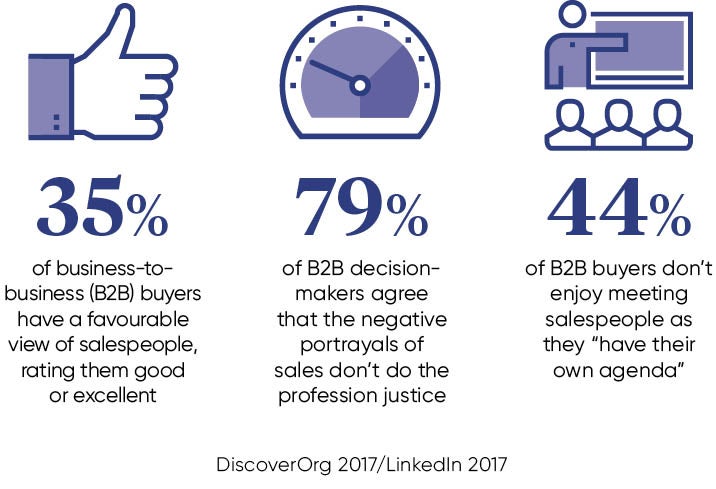Willy Loman, a character from Arthur Miller’s play Death of a Salesman, would still recognise his industry if he walked into an office in the 21st century. “The mindset for many is still in the 1950s,” says Ian Price, business psychologist at Recludo Consulting.
“I’m talking about how sales are measured. Most sales are still made at an emotional level. There are still people who are recruited to manipulate us to buy things. There’s a churn of staff and the training is still the same.”
However, more than 60 years on and the UK sales profession is now in the midst of a significant evolution, albeit a quiet one. It’s rebounding from decades of negative perceptions associated with selling advertising space, double-glazing or time-share and is increasingly recognised as one of the most critical business functions.
Sales in 2017
“The perception of sales needs to improve. It is often viewed as a short-term and replaceable cost rather than a professionally qualified, long-term investment,” explains Nick Porter, chairman of the Association of Professional Sales.
Driven by quarterly reporting pressures and fierce global competition, industry is crying out for strong, highly trained salespeople who can cut through the information overload of the internet age and make a real difference to companies’ bottom line.
It is a fact not lost on the cohort of students who will be starting fresh sales degrees this autumn. Four universities have just begun offering new courses in this field. Before 2017, a degree focused on sales was hard to come by, despite more than two million people working in the sector, according to the Institute of Sales and Marketing Management.
The UK is only now starting to professionalise this business function, helped by assistance for sales students through the apprenticeship levy and the work of the Association of Professional Sales. However, the sector in the UK has a long way to catch up with its transatlantic counterpart.
“The biggest difference is that sales as a profession is better regarded in America and has a stronger academic underpinning with many universities offering formal sales education, but this is changing in the UK,” says Mr Porter.
In the United States, sales roles are viewed as high-income opportunities, many dedicate their whole career to the profession, investing in themselves, reading books and continuing to learn. It would be rare for a UK sales representative to see themselves as solely having a career in this profession. They’re more likely to pledge allegiance to an industry sector or a corporation than to sales itself.
“Talent is the single biggest issue in today’s UK sales environment. Until the profession can create a high-quality inflow of people who want to have a career in this sector, there will continue to be a shortage of salespeople and sales leaders driving growth,” says Mr Porter.
Sales in the internet age
Certainly, the dearth of trained salespeople is now driving change. Interestingly, Miller’s play is as relevant today as it was when he wrote it in 1949. His character Loman admired a successful salesman, who was well liked, loved and remembered by his business contacts. In an age where social media, social selling and relationship building are now king, this insight is prescient.
“It’s now less about how many sales calls you make a day and leads you generate. More organisations are tracking the number of social engagements and how a ‘circle of influence’ is built,” says Jake Spence, sales operations director at durhamlane. “There’s no single channel this will come from; the reality is that telephone, e-mail, social and digital engagement are all fundamental to success.”
The biggest arbiter of change has been the internet. In the past, there was incredible information asymmetry between salespeople and those they sold to. A rep could be a talking brochure and make a sale. Now customers don’t have time for the abrasive trickery of salespeople. A buyer can get all the information they need online. The worldwide web has been a great leveller.
The sales profession is now moving up the value chain
“Stereotypical salespeople used to be tolerated and now add little value. The challenge is that these old-school salespeople are still asked to train new talent. This approach perpetuates the skills gap,” says Ian Altman, author and business-to-business sales expert.
“The top-performing companies now focus their sales on industry or niche expertise to ensure that clients get the best results. These corporations realise they have a responsibility to deliver results for the client, not just make the sale.”
In other words, the sales profession is now moving up the value chain. Buyers are looking for a lot more value beyond just a binary transaction, the sale and purchase of a product. They want insight and partners who can help them grow their business. This takes a whole new level of competence.
“Interestingly sales teams are becoming more like business consultants and consultancies, such as McKinsey, Boston Consulting Group or Deloitte, and are increasingly having to go out there and sell their services,” says Mr Price. “Everyone is having to offer genuine business insight right now.”
Moving up the value chain is the best thing that can happen to the profession both in the UK and US. Technological automation and artificial intelligence are already starting to eliminate low-value activities performed by salespeople. For instance, online chatbots are filling clients’ knowledge gap.
“This may well mean that the number of people required in sales roles will go down,” says Mr Porter. “But in a complex sales environment, the role the salesperson performs when they meet a potential customer, develop trust, understand the customer’s needs, and then create and deliver a solution, will remain a mainly human-to-human process.” It’s good to know that there’s still life rather than death for a salesman.






